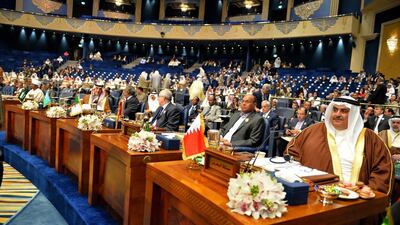KUWAIT CITY // Between meetings to discuss turmoil across the region, statesmen and dignitaries attending an Arab League summit at the Bayan Palace have dined on freshly served dishes of chicken biryani and Arab salad.
Fountains and rows of palm trees greet them as they enter this sprawling complex, located on the outskirts of Kuwait City and outfitted with a helicopter landing pad and conference halls with high-speed internet.
In many ways, Bayan Palace, a plush bastion of stability and luxury, highlights the different realities of Arab countries.
In Egypt, just a two-hour flight east, the role of Islam in politics has paralysed society. An even shorter fight away, in Syria, sectarian divisions fuel a civil war in which more than 140,000 people have been killed while millions more have been displaced. Similar tensions also threaten to tear apart Iraq, just an hour’s drive north for the BMW and Mercedes-Benz luxury vehicles that pass through the gates of the palace.
Tellingly, though, it was a diplomatic spat here on Tuesday between GCC states that took centre stage.
Scrambling for interviews at Bayan's hallways, journalists were keen to ask whether the UAE, Saudi Arabia and Bahrain would patch up their differences with Qatar after withdrawing their ambassadors from Doha this month over its support for the Muslim Brotherhood.
Political observers say the row is noteworthy for the GCC, which consists of the UAE, Saudi Arabia, Qatar, Kuwait, Bahrain and Oman. Few here recall tensions between the six-member union ever being so high. But compared with the rest of the region’s ferment, it could be worse for the Gulf Arabs.
That may explain why an impassioned appeal during the summit’s opening ceremony here by Syrian opposition leader Ahmad Jarba seemed to highlight the chasm that separates the Arabian Gulf from the rest of the region. The head of Syrian National Council came to Kuwait all but begging for more aid — including more powerful weapons — for rebels seeking to topple the regime of Syrian president Bashar Al Assad.
That appeal, intentionally or not, demonstrated where Arab power has shifted. GCC states, buoyed by vast oil and gas revenues and fast-developing economies, are the front-runners in aiding the Syrian opposition. Indeed, they are backing and in some case bankrolling the insurgents and militaries and opposition groups that span from the Nile to the Euphrates and beyond.
Gone are the days when outside powers looked to sway regional events through such capitals of Cairo. Now, it is here in the Gulf where Washington and Brussels look to first in the Arab world for common cause regarding regional events.
On Friday, the US president, Barack Obama, travels to Riyadh on a special visit aimed at mending the GCC rift and allaying concerns over a US-Iran rapprochement deal that has alarmed the Saudi monarchy.
Whether the US leader succeeds in cobbling together a more coherent GCC regional policy, let alone mollify concerns over Iran, remains to be seen. But what has become evident is to which corridors of power in the region Mr Obama and fellow world leaders have set their sights on.
They are in such palaces as Bayan, where in its gilded conference rooms and lush courtyards the fate of a tumultuous region will be steered.
hnaylor@thenational.ae

